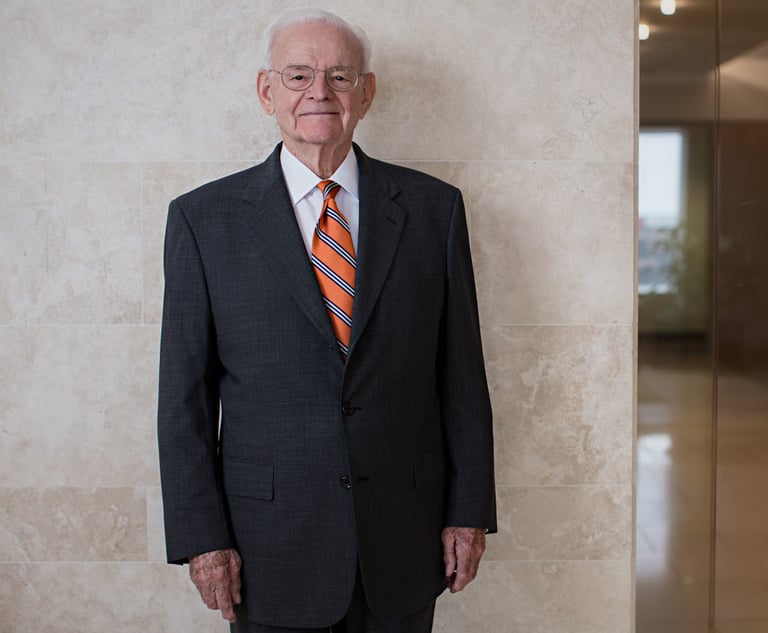Bankruptcy Court Rejects Hypothetical Preference Waiver in Critical Vendor Defense
In a matter of first impression within the U.S. Court of Appeals for the Second Circuit, the U.S. Bankruptcy Court for the Eastern District of New York recently rejected a preference defendant's request to apply a “hindsight analysis” in order to determine that a hypothetical preference waiver would have been granted in its favor.
December 27, 2018 at 01:06 PM
6 minute read
 Rudolph J. DiMassa Jr. and Keri L. Wintle of Duane Morris.
Rudolph J. DiMassa Jr. and Keri L. Wintle of Duane Morris.In a matter of first impression within the U.S. Court of Appeals for the Second Circuit, the U.S. Bankruptcy Court for the Eastern District of New York recently rejected a preference defendant's request to apply a “hindsight analysis” in order to determine that a hypothetical preference waiver would have been granted in its favor, as it claimed to be a “critical vendor” of the debtors in Devices Liquidation Trust v. KMT Wireless, (In re Personal Communications Devices), 588 B.R. 661 (Bankr. E.D.N.Y. 2018).
Background and Bankruptcy Filing
The debtors, Personal Communications Devices (PCD) and Personal Communications Devices Holdings, were wireless telecommunications companies that served as intermediaries between domestic wireless providers and international wireless accessories manufacturers, as distributors of wireless devices and accessories. The debtors' devices were sold with a comprehensive warranty that required PCD to provide certain repair services. PCD also offered repair and refurbishing services for wireless devices with expired warranties. Nearly all of these repair services were performed by two third-party vendors; KMT Wireless was one of these third-party vendors.
The debtors filed voluntary Chapter 11 petitions in August 2013, and their cases were jointly administered. In an effort to continue to honor customers' warranty repair services pending a sale of substantially all of their assets, the debtors filed a “customer programs motion” seeking to continue to maintain and administer their customer repair programs. In this motion, the debtors represented to the court that “certain third-party repair service vendors” were critical to the debtors' operations and to their ability to honor warranty claims and perform out-of-warranty repair and refurbishing services. Although the customer programs motion did not specifically identify KMT Wireless, there was no real disagreement about the fact that KMT Wireless: had been paid in full for its prepetition services to the debtors; had provided all the post-petition services it had been requested of the debtors to perform; and was paid for its post-petition services to the debtors.
The court's order granting the customer programs motion authorized (but did not direct) the debtors to pay and honor prepetition obligations under the customer programs. The sale of the debtors' assets was approved in October 2013, and a liquidating plan was confirmed in April 2014.
Preference Action
In 2015, the trustee of the liquidating trust that had been created under the debtors' liquidating plan initiated an adversary proceeding against KMT Wireless seeking to avoid and recover alleged preferential transfers in the aggregate amount of $3,824,194.36.
KMT Wireless asserted various defenses to the trustee's preference claims, and filed a motion for summary judgment requesting that the bankruptcy court perform a “hindsight analysis” in order to determine that KMT Wireless would have been granted a preference waiver had the debtors made such a request in connection with the customer programs motion. KMT Wireless's “unique” theory was that it was protected as a critical vendor under the customer programs motion; consequently, it urged the court to make a hypothetical determination as to how the court would have ruled had the debtors sought approval of the waiver of KMT Wireless's preference liability.
In support of its summary judgment motion, KMT Wireless submitted affidavits acknowledging that KMT Wireless's repair services were critical to the debtors' continuation of the customer warranty programs through the sale of their assets. KMT Wireless further asserted that, without its repair services, the debtors' operations would not have been able to continue and, therefore, a sale of the debtors' assets would not have occurred.
In response, the liquidating trustee submitted declarations by three creditors, each affirmatively stating that it would have filed a hypothetical objection to the debtors' hypothetical request for a preference waiver in favor of KMT Wireless.
Analysis
The bankruptcy court reviewed decisions of several courts ruling on a “critical vendor” defense to a preference claim in the context of summary judgment. Of the four cases cited by the court, only one was decided favorably to a preference defendant. In AFA Investments v. Trade Source, (In re AFA Investments Inc.), 538 B.R. 237 (Bankr. D. Del. 2015), the debtors and the defendant had entered into a continued services agreement, pursuant to a critical vendor order, which required the debtors to pay the defendant's prepetition claims in exchange for the defendant's continued services. In considering the debtors' motion for summary judgment on their preference claims against the defendant, the AFA court found that the debtors could not satisfy their burden to demonstrate that the alleged preference payments allowed the defendant to receive more than it would have received in a Chapter 7 case, as the defendant would have received payment of its prepetition claims in full pursuant to the critical vendor order.
The bankruptcy court in Personal Communications had little difficulty distinguishing the facts of the AFA case from the facts sub judice. The court first noted that its order granting the customer programs motion was permissive, rather than mandatory, with respect to the debtors' payment of prepetition obligations under the customer program. The court pointed out that KMT Wireless was not specifically identified in the customer programs motion as a “critical vendor.” It also observed that the customer programs motion was as silent as to any waiver of preference liability. As a result, the bankruptcy court rejected KMT Wireless's critical vendor defense, stating that it would “not at this juncture conjecture as to whether debtors would have made the hypothetical preference waiver request and who might have objected to it and what ruling it might have made.” The court denied KMT Wireless's motion for summary judgment.
Conclusion
The Personal Communications case provides a relatively straightforward practical lesson for critical vendors seeking to insulate themselves from preference liability. These vendors should first ensure that any order: specifically identify them as critical vendors; contain language directing, rather than authorizing, payment of any prepetition claims; and include an express waiver of all preference claims against them. Should these vendors succeed in including these items in their debtor's critical vendor motion that is ultimately approved by the bankruptcy court, they will most likely avoid any liability to disgorge payments that might otherwise be considered preferential.
Rudolph J. Di Massa Jr., a partner at Duane Morris, is a member of the business reorganization and financial restructuring practice group. He concentrates his practice in the areas of commercial litigation and creditors' rights.
Keri L. Wintle, an associate at Duane Morris, practices in the area of business reorganization and financial restructuring with a focus on bankruptcy and creditors' rights. Ms. Wintle represents trustees, corporate debtors, creditors and creditor committees in Chapter 7 and 11 cases.
This content has been archived. It is available through our partners, LexisNexis® and Bloomberg Law.
To view this content, please continue to their sites.
Not a Lexis Subscriber?
Subscribe Now
Not a Bloomberg Law Subscriber?
Subscribe Now
NOT FOR REPRINT
© 2025 ALM Global, LLC, All Rights Reserved. Request academic re-use from www.copyright.com. All other uses, submit a request to [email protected]. For more information visit Asset & Logo Licensing.
You Might Like
View All
Commonwealth Court Overturns Award of Damages Assessed Against Landlord on Claims of Unlawful Discrimination
6 minute read

Judge Louis C. Bechtle: An American Jurist Who Relied on Common Sense, Sound Judgment and Fairness
5 minute read
Six Ways Thought Leadership Can Support Your Law Firm’s 2025 Strategic Plan
6 minute readTrending Stories
- 111th Circuit Rejects Trump's Emergency Request as DOJ Prepares to Release Special Counsel's Final Report
- 2Supreme Court Takes Up Challenge to ACA Task Force
- 3'Tragedy of Unspeakable Proportions:' Could Edison, DWP, Face Lawsuits Over LA Wildfires?
- 4Meta Pulls Plug on DEI Programs
- 5On the Move and After Hours: Meyner and Landis; Cooper Levenson; Ogletree Deakins; Saiber
Who Got The Work
Michael G. Bongiorno, Andrew Scott Dulberg and Elizabeth E. Driscoll from Wilmer Cutler Pickering Hale and Dorr have stepped in to represent Symbotic Inc., an A.I.-enabled technology platform that focuses on increasing supply chain efficiency, and other defendants in a pending shareholder derivative lawsuit. The case, filed Oct. 2 in Massachusetts District Court by the Brown Law Firm on behalf of Stephen Austen, accuses certain officers and directors of misleading investors in regard to Symbotic's potential for margin growth by failing to disclose that the company was not equipped to timely deploy its systems or manage expenses through project delays. The case, assigned to U.S. District Judge Nathaniel M. Gorton, is 1:24-cv-12522, Austen v. Cohen et al.
Who Got The Work
Edmund Polubinski and Marie Killmond of Davis Polk & Wardwell have entered appearances for data platform software development company MongoDB and other defendants in a pending shareholder derivative lawsuit. The action, filed Oct. 7 in New York Southern District Court by the Brown Law Firm, accuses the company's directors and/or officers of falsely expressing confidence in the company’s restructuring of its sales incentive plan and downplaying the severity of decreases in its upfront commitments. The case is 1:24-cv-07594, Roy v. Ittycheria et al.
Who Got The Work
Amy O. Bruchs and Kurt F. Ellison of Michael Best & Friedrich have entered appearances for Epic Systems Corp. in a pending employment discrimination lawsuit. The suit was filed Sept. 7 in Wisconsin Western District Court by Levine Eisberner LLC and Siri & Glimstad on behalf of a project manager who claims that he was wrongfully terminated after applying for a religious exemption to the defendant's COVID-19 vaccine mandate. The case, assigned to U.S. Magistrate Judge Anita Marie Boor, is 3:24-cv-00630, Secker, Nathan v. Epic Systems Corporation.
Who Got The Work
David X. Sullivan, Thomas J. Finn and Gregory A. Hall from McCarter & English have entered appearances for Sunrun Installation Services in a pending civil rights lawsuit. The complaint was filed Sept. 4 in Connecticut District Court by attorney Robert M. Berke on behalf of former employee George Edward Steins, who was arrested and charged with employing an unregistered home improvement salesperson. The complaint alleges that had Sunrun informed the Connecticut Department of Consumer Protection that the plaintiff's employment had ended in 2017 and that he no longer held Sunrun's home improvement contractor license, he would not have been hit with charges, which were dismissed in May 2024. The case, assigned to U.S. District Judge Jeffrey A. Meyer, is 3:24-cv-01423, Steins v. Sunrun, Inc. et al.
Who Got The Work
Greenberg Traurig shareholder Joshua L. Raskin has entered an appearance for boohoo.com UK Ltd. in a pending patent infringement lawsuit. The suit, filed Sept. 3 in Texas Eastern District Court by Rozier Hardt McDonough on behalf of Alto Dynamics, asserts five patents related to an online shopping platform. The case, assigned to U.S. District Judge Rodney Gilstrap, is 2:24-cv-00719, Alto Dynamics, LLC v. boohoo.com UK Limited.
Featured Firms
Law Offices of Gary Martin Hays & Associates, P.C.
(470) 294-1674
Law Offices of Mark E. Salomone
(857) 444-6468
Smith & Hassler
(713) 739-1250





